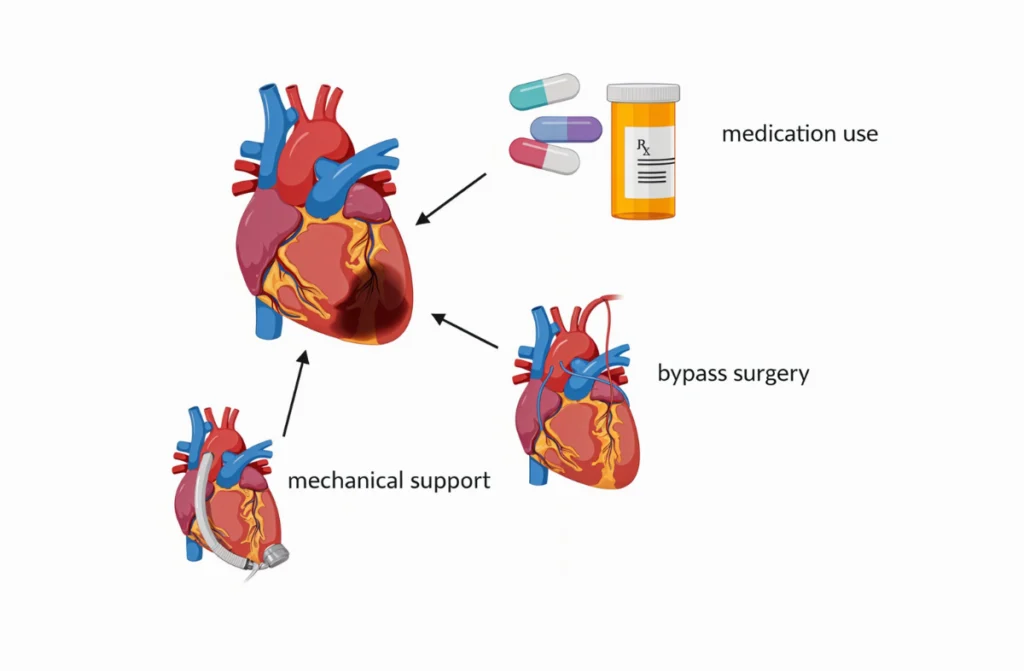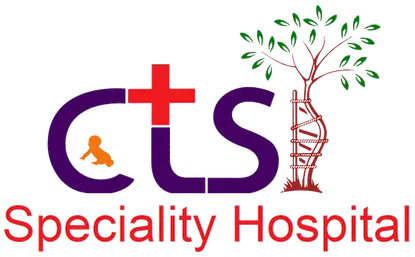Heart failure is a serious condition that can greatly impact daily living, but with the right treatments, patients can find relief and improve their quality of life. At cardiac Hospitals, our approach to heart failure treatments focuses on personalized care to help patients regain heart strength, reduce symptoms, and improve long-term health. By exploring the causes, symptoms, and various treatment options, individuals can take proactive steps towards managing heart failure effectively.

What is Heart Failure?
Heart failure occurs when the heart can’t effectively pump blood, limiting oxygen and nutrient delivery throughout the body. This impairment can arise suddenly or develop over time. Early recognition and treatment are crucial, as timely interventions can strengthen heart function and reduce symptoms.
- Restricted oxygen and nutrient supply to critical organs
- Potential fluid buildup in the lungs, abdomen, or limbs
- Often linked to conditions such as coronary artery disease or high blood pressure
- Proper treatment helps relieve symptoms and supports overall heart health
Symptoms of Heart Failure
Being able to recognize the symptoms of heart failure early allows for prompt intervention. Symptoms can vary in intensity and often impact a person’s daily routine. Some common signs of heart failure include:
- Shortness of breath, particularly during physical activity or when lying down
- Persistent coughing or wheezing, sometimes accompanied by mucus
- Swelling in areas like the feet, ankles, and abdomen
- Extreme fatigue or weakness, even after adequate rest
- Rapid or irregular heartbeat
Understanding these symptoms can empower individuals to seek heart failure treatments that alleviate discomfort and prevent the condition from worsening.
Diagnosis and Tests
Accurate diagnosis is vital for effective treatment of anemic heart failure and other cardiac conditions. Doctors of heart specialist rely on a combination of medical history, physical examination, and diagnostic tests to identify the severity of heart failure and its underlying causes.
Common tests for heart failure diagnosis:
- Electrocardiogram (ECG): Records the heart’s electrical activity.
- Echocardiogram: Evaluates heart structure and function using ultrasound.
- Blood Tests: Detect markers for anemia or other conditions.
- Chest X-ray: Identifies fluid buildup or lung complications.
- Stress Test: Assesses heart performance during physical exertion.
Understanding chronic heart failure symptoms aids early detection and timely treatment. Regular screenings for high-risk individuals help monitor heart health and prevent complications. Working with healthcare providers ensures a precise diagnosis and an appropriate treatment plan tailored to individual needs.
Types of Heart Failure
Heart failure is a condition where the heart struggles to pump blood efficiently, leading to various symptoms. There are different types of heart failure, each categorized based on the part of the heart affected or the way it functions. Understanding these types helps in effective diagnosis and treatment.
Common types of heart failure:
- Left-sided heart failure:
- Involves the left ventricle, leading to fluid buildup in the lungs.
- Causes symptoms like shortness of breath and fatigue.
- Right-sided heart failure:
- Affects the right ventricle, causing fluid retention in the lower body.
- Symptoms include swelling in the legs and abdomen.
- Congestive heart failure:
- A combination of both left and right-sided failure.
- Leads to severe fluid buildup and breathlessness.
Recognizing the types of heart failure early can aid in personalized treatment, improving outcomes and quality of life. Regular medical check-ups are essential for managing the condition effectively.
Causes of Heart Failure
Knowing the underlying causes of heart failure is essential for effective treatment and prevention. At CTS Hospitals, we emphasize early identification of these risk factors, enabling timely interventions that improve outcomes. Major causes of heart failure include:
- Coronary artery disease (CAD): Narrowed arteries reduce blood flow to the heart muscle, gradually weakening it.
- High blood pressure: Elevated blood pressure strains the heart, making it work harder over time, leading to wear and reduced efficiency.
- Heart attack: The sudden loss of blood flow damages the heart muscle, sometimes irreversibly.
- Diabetes: This condition increases the risk of cardiovascular disease, often leading to heart failure.
Addressing these factors early with personalized treatments can help improve heart health and reduce progression.
Heart Failure Treatments Options
Heart failure treatments encompass a wide range of approaches, from medications to surgical interventions, all aimed at improving heart function and managing symptoms. These strategies are tailored to the patient’s specific needs, ensuring better quality of life and reduced complications. Among the available options, medications play a vital role in addressing the condition effectively, including the treatment of anemic heart failure, which often involves specialized care.
Medications for Heart Failure
- ACE Inhibitors and ARBs
These medications help to dilate blood vessels, reducing heart strain and easing the heart’s workload. By lowering blood pressure, ACE inhibitors and ARBs slow the progression of heart failure and protect heart muscle from further damage. - Beta-blockers
Beta-blockers reduce the heart’s workload by slowing the heart rate and lowering blood pressure. This not only prevents complications but also supports heart health by reducing the frequency of abnormal heart rhythms. - Diuretics
Diuretics, often referred to as “water pills,” assist in eliminating excess fluid from the body, which can accumulate due to heart failure. By reducing fluid buildup, diuretics alleviate symptoms like swelling and shortness of breath, enabling the heart to function more efficiently. - SGLT2 Inhibitors
Originally used to control blood sugar in diabetes, SGLT2 inhibitors are now recognized for their benefits in heart failure patients. They lower blood pressure and reduce fluid retention, supporting the heart’s overall workload. - Digoxin
Digoxin increases the force of each heartbeat, which is particularly helpful for those with severe symptoms. By enhancing the heart’s ability to pump blood, digoxin helps relieve symptoms such as fatigue and breathlessness. - ARNIs (Angiotensin Receptor-Neprilysin Inhibitors)
ARNIs combine the effects of ARBs with neprilysin inhibition, resulting in relaxed blood vessels and better fluid regulation. This dual action improves heart function, reduces hospitalization rates, and slows heart failure progression.
Surgical Procedures for Heart Failure Treatments
- Coronary Bypass Surgery
This surgery reroutes blood around blocked arteries to improve blood flow to the heart muscle, helping alleviate symptoms like chest pain and shortness of breath. - Implantable Cardioverter-Defibrillator (ICD)
An ICD is a small device placed in the chest that monitors and corrects abnormal heart rhythms, such as those that can lead to sudden cardiac arrest. It detects irregular rhythms and delivers a corrective shock if necessary. - Heart Valve Repair or Replacement
For patients with heart valve issues, repair or replacement restores normal blood flow, alleviating the heart’s workload and reducing strain. This procedure can improve symptoms and support heart function over the long term. - Heart Transplant
In advanced cases where other treatments are ineffective, a heart transplant may be necessary. This complex procedure replaces the failing heart with a healthy donor heart, offering a new lease on life for patients with severe heart failure.
Prevention from Heart Failure
Preventing heart failure involves adopting a heart-healthy lifestyle and managing underlying health conditions. Chronic conditions like hypertension, diabetes, and high cholesterol significantly increase the risk of heart failure. Recognizing chronic heart failure symptoms early and making lifestyle changes can reduce the likelihood of developing heart complications.
Tips for heart failure prevention:
- Maintain a balanced diet rich in fruits, vegetables, and whole grains.
- Engage in regular physical activity tailored to your fitness level.
- Avoid smoking and limit alcohol consumption.
- Manage stress with relaxation techniques like yoga or meditation.
- Monitor and control chronic conditions under medical supervision.
Timely intervention and regular health check-ups are crucial for prevention. Addressing risk factors like obesity and sedentary behavior can improve heart health and reduce the chances of heart failure. Taking proactive steps ensures long-term cardiovascular wellness.
Conclusion
Effective heart failure treatments play a crucial role in managing symptoms and enhancing the quality of life. At CTS Hospitals, we provide a comprehensive range of heart failure treatments options tailored to meet each patient’s needs, from medication management to advanced surgical solutions. Our mission is to support patients on their journey to improved heart health and better living. If you or someone you know is experiencing symptoms of heart failure, the expertise at CTS Hospitals is here to help.

